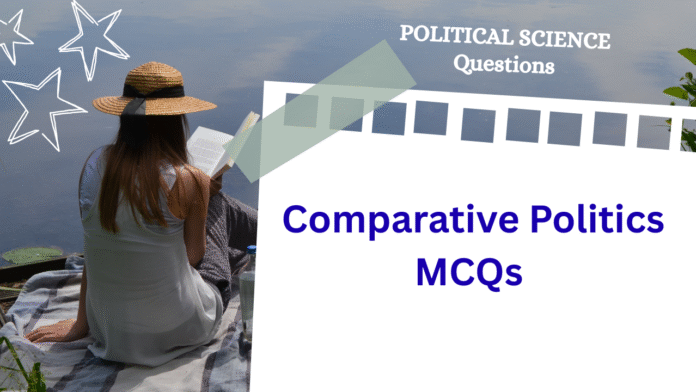30 Comparative Politics MCQs with Answers
In our Political Science Question series, we added more than 30 Comparative Politics MCQs with Answers that can help political science students in their journey of preparation for CUET PG entrance tests, as well as for the Political Science NTA NET exam.
- Who is known as the father of Comparative Politics?
a) Plato
b) Aristotle
c) Tocqueville
d) Machiavelli
Ans: b) Aristotle
2. According to whom, “Comparative Politics is the study of the forms of political organization, their properties, correlations, variations and modes of change”?
a) Chilcote
b) G. Smith
c) Maxey
d) Karl Deutsch
Ans: b) M.G. Smith
3. According to whom, “comparative politics is “the study of patterns of national governments in the contemporary world”.
a) Maxey
b) John Blondel
c) O Neil
d) Freeman
Ans: b) John Blondel
4. Who stated that “Comparative Politics is a comparative analysis of the various forms of government and diverse political institutions”?
A) Almond
b) Powell
c) E. A Freeman
d) Ronald Chilcote
Ans: c) E.A Freeman
5. Who wrote the book “Constitutional Government and Democracy”?
a) Carl J. Friedrich
b) H. Tawney
c) Jean Blondel
d) Lasswell and Kaplan
Ans: a) Carl J. Friedrich
6. The “Modern Democracies” book is written by whom?
a) Carl J. Friedrich
b) James Byce
c)Jean Blondel
d)Lasswell and Kaplan
Ans:b) James Bryce
7. Who gave the idea of the ‘end of history’?
a) Fukuyama
b) David Apter
c) Sidney Verba
d) Jean Blondel
Ans: a) Fukuyama
8. Who wrote the book “What is Political Philosophy”?
a) James Bryce
b) Leo Strauss
c) Roy Macridis
d) M. Lipset
Ans: b) Leo Strauss
Click Here for more – Political Science Questions
9. Which level of analysis in comparative politics focuses on the interactions between countries?
a) Individual level
b) Domestic level
c) Systemic level
d) State level
Ans: c) Systemic level
10. Who used the comparative method to study the constitutions and to classify the systems of government?
a) Aristotle
b) Machiavelli
c) Montesquieu
d) Lord Bryce
Ans: a) Aristotle
11. Which among the following comes under the scope of comparative politics and government?
a) Political Experiences
b) Political institutions
c) Political Behaviour
d) All of the above
Ans:d) All of the above
12. Who among the following used the comparative method in determining the qualities of a successful ruler?
a) Aristotle
b) Machiavelli
c) Montesquieu
d) Lord Bryce
Ans: b) Machiavelli
Approaches to the Study of Comparative Politics
13. Which approach of comparative politics emerged as a response to the historicism of the 19th century?
a) Modern approach
b) System approach
c) Traditional approach
d) All of the above
Ans: c) Traditional approach
14. “Modern Political Regime” book written by whom?
a) Roy Macridis
b) Peter Markl
c) David E. Apter
d) Harry Eckstein
Ans: a) Roy Macridis
15. Philosophical approach is also known as –
a) Speculative approach
b) Ethical approach
c) Meta-physical approach
d) All of the above
Ans: d) All of the above
16. Which of the following approaches is best represented by George H. Sabine?
a) Philosophical approach
b) Historical approach
c) Institutional approach
d) Legal approach
Ans:b) Historical approach
17. The General system approach was expounded by
a) Morton Kaplan
b) Ludwig Von Bertalanffy
c) David Easton
d) Karl Deutch
Ans: b) Ludwig Von Bertalanffy
18. The input-output approach and structural-functional approach have been derived from:
a) The Quantitative approach
b) Institutional approach
c) Sociological approach
d) The General System approach
Ans: d) The General System approach
19. According to whom, “Political science is the study of shaping and sharing of power?
a) Lasswell and Kaplan
b) Paul Janet
c) Gabriel Almond
d) David Easton
Ans: a)Lasswell and Kaplan
20. Who gave the black-box model?
a) Lasswell and Kaplan
b) Paul Janet
c) Gabriel Almond
d) David Easton
Ans: d) David Easton
21. Who wrote the book “Process of Government”?
a) Robert A. Dahl
b) Talcott Parson
c) David Easton
d) Arthur Bentley
Ans: d)Arthur Bentley
22. The main exponent of the Political communication approach?
a) Karl Deutsch
b) Max Weber
c) Bingham Powell
d) Carl J. Friedrich
Ans: a) Karl Deutsch
23. How many input functions are given by Gabriel Almond in his structural-functional approach?
a) 3
b) 4
c) 5
d) None of the above
Ans:b) 4
24. Who among the following is not an exponent of the philosophical approach to study comparative Politics?
a) Plato
b) Kant
c) Bacon
d) Bentham
Ans: d) Bentham
25. Who wrote the book “Rationalism in Politics”?
a) Michael Oakeshott
b) Max Weber
c) Bingham Powell
d) Carl J. Friedrich
Ans: a) Michael Oakeshott
26. Which among the following approaches “treats the state primarily as an organization for the creation and enforcement of law”?
a) Legal approach
b) Institutional approach
c) System approach
d) Quantitative approach
Ans: a)Legal Approach
27. Which approach studies the formal structures of the political organizations?
a) Traditional approach
b) Legal approach
c) Normative approach
d) Institutional approach
Ans:d) Institutional approach
28. Which one of the following is not an input function of the political system?
a) Political recruitment
b) Interest articulation
c) Rule adjudication
d) Political communication
Ans: c) Rule adjudication
29. David Easton stated that in the political system, there are 2 kinds of political inputs –
a) Demand and Support
b) Pressure and threat
c) Political parties
d) Voting and accountability
Ans: a) Demand and Support
30. Who said, “The State is a march of God on Earth”?
a) Plato
b) Kant
c) Bacon
d) Hegel
Ans: d) Hegel
Comparative Politics MCQs with Answers PDF Download

